Is Avon a Pyramid Scheme? A Deep Dive Into the Avon MLM
Not too long ago, I penned an article about the ‘Avon opportunity,’ and why Avon might not be the best company to join if you’re looking to make a lot of money.
However, during my research for that article, I couldn’t help but notice that a lot of people are Googling ‘is Avon a pyramid scheme?’ reflecting larger concerns about Avon as a company.
I’m no stranger to doing deep dives on this stuff, so I figured that it couldn’t hurt to take a closer look into Avon to see just how Avon functions as a company and whether they are operating as a pyramid scheme.
Is Avon a Pyramid Scheme? A Deep Dive Into the Avon MLM
What is Avon?
Avon was founded in 1886 by David McConnell and is pretty much the OG direct sales company.
It all began when David, who used to knock on women’s doors selling books, realised that what the women really wanted was perfume, and so he switched up his game and started selling that instead.
It didn’t take long for his new venture to flourish, and now the company that we know as Avon is the fourteenth-largest beauty company in the world, selling everything from concealers and mascaras to hair serums, moisturisers and more.
Avon also holds the title of being the oldest direct sales company ever, and the second-largest MLM company in the world after Amway!
You see, although Avon used to use the direct sales business model, they switched things up in 2005 to a multi-level marketing structure, and there are now around 6.5 million Avon representatives around the world selling Avon products and recruiting others into the biz.

What is MLM?
MLM stands for multi-level marketing, and MLM companies are also known as network marketing companies.
You don’t receive a salary in an MLM. Instead, you earn money from selling products to people you know and recruiting others into the business.
When you recruit a new person and that person begins earning money, you will earn commission from the sales and recruits generated from THAT person.
This continues down in multiple levels (hence multi-level).
Now, while you can make money from selling whichever product your MLM company offers (in Avon’s case it would be beauty products), most people in MLM companies prefer to recruit others because they stand to make a lifelong passive income from that person, whereas if they sell a product they will just receive a one-off commission.
The ultimate aim of somebody in an MLM company like Avon then, is to recruit as many people as possible, enabling them to make large amounts of passive income for little work.
MLMs and Pyramid Schemes
Lots of MLM companies find themselves being compared to illegal pyramid schemes – even the popular Secret Sister Christmas game has been accused of operating like a pyramid scheme.
Avon is no different – actually they flouted China’s anti-pyramid scheme law!
But what is a pyramid scheme?
Well, pyramid schemes are very similar to MLMs in the way that they are structured, but the main difference is that MLM companies also sell a product as well as paying people to recruit others into the business.
A pyramid scheme will take an initial investment from each member and promise to pay them for enrolling others into the scheme. You are never buying a product; you are buying into an ‘opportunity’ to get rich.
However, as members of the scheme increase, recruiting quickly becomes impossible and so most members are unable to profit from the scheme or even make their initial investment back.
The Wikipedia diagram below illustrates just how unsustainable this is – after just a few levels of recruitment, the scheme would have recruited everybody on the planet and there would simply be no-one left to recruit!
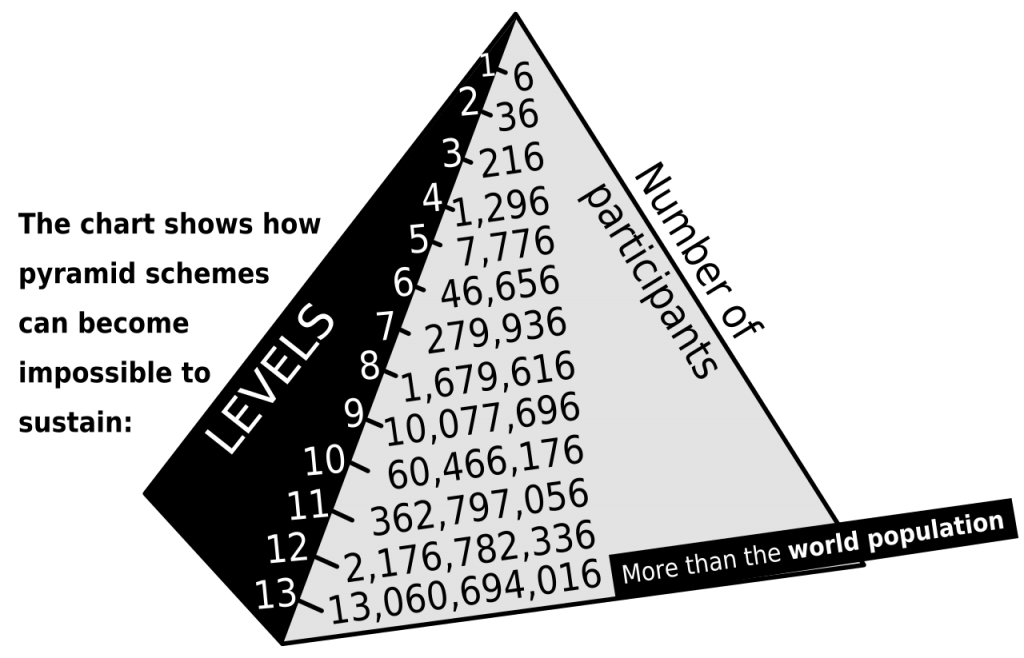
Because it is impossible for most people to make any money in a pyramid scheme, pyramid schemes are illegal.
MLM companies like Avon are not illegal because there is a possibility to make money from selling products and not just recruiting.
However, this doesn’t mean that some MLM companies are not still operating as pyramid schemes. Although a business may be carefully crafted to appear like a totally legit multi-level marketing company, it could still be exploiting loopholes in order to skirt around the law and function as a pyramid scheme in disguise.
In order to assess whether Avon is a pyramid scheme, we must dive in deep and look at just how this company operates.
Is Avon a Pyramid Scheme?
While Avon used to be a purely direct sales business, they have been an MLM company for over 15 years, meaning that as well as selling products to retail customers, Avon reps can also make money by recruiting others into the company – selling the ‘business opportunity.’
Because of this shift in focus towards recruitment, many people have been left wondering whether the Avon they so loved in days gone by is now part of the shady world inhabited by MLMs such as Monat and Arbonne, who claim to be legit and ethical businesses, but are kiiiiinda functioning as pyramid schemes (allegedly).
At a glance, the tagline of Avon’s website tells us a whole lot about the company’s priorities.

The first thing that Avon are promoting is the opportunity to ‘Become an Avon Representative,’ rather than the products themselves (which almost seem like a side note).
As many of you will know, a tell-tale sign of a pyramid scheme is when a company shouts louder about signing up for their ‘opportunity’ rather than buying their products.
However, a tagline alone isn’t enough to classify Avon as a pyramid scheme.
In order to fully understand how Avon is functioning today, we need to take a step back in time to where this all began…

Avon announced its shift towards recruiting in 2005. This was part of a large ‘restructuring programme’ that was designed to boost sales and cut costs.
In its 2005 report to the SEC (Securities and Exchange Commission), Avon announced its plans for ‘expanding our Sales Leadership programme and improving the attractiveness of our Representative earnings opportunity,’ describing the programme as a ‘multi-level compensation programme which gives Representatives the opportunity to obtain earnings from commissions based on sales made by Representatives they have recruited and trained.’
This focus on selling an ‘income opportunity’ rather than cosmetics was clear in Avon’s largest advertisement in its history – the 2009 Super Bowl.
In this commercial, which was delivered to the largest television audience of the whole year, Avon did not promote any of its cosmetics, but instead hyped up the ‘income opportunity,’ and encouraged the audience to contact an Avon representative to find out more.
‘So what?’ You may be thinking.
Can we really blame Avon for wanting to step up their game and move forward into the 21st century?
Usually, I’d say no.
In fact, if we were talking about any subject other than multi-level marketing, I’d take my hat off to a business as old as Avon switching things up and following the direction taken by their competitors.
However, when we begin to look at why Avon changed its business model, things become a lot more worrying.
In 2009, the number of active Avon Representatives at the end of the year was 3% more than the year before, while overall revenue was down 9%.
This means that in 2009, Avon was aggressively recruiting new salespeople into a declining market, intentionally flooding the space with more and more Reps when the retail demand for products was simply not there.
An extremely telling (read: worrying) piece in a 2009 USA Today article seems to confirm that this was intentional.
‘Right now, our direct-selling opportunity is really the No. 1 product that we have to sell,’ said Geralyn Breig, president of Avon North America.
To the uninitiated, this may not seem like a big deal.
However, when you think about the literal definition of a pyramid scheme, Geralyn’s statement becomes a lot more troubling.
After all, if the opportunity is the ‘No. 1 product,’ then isn’t Avon operating as a pyramid scheme?
As we discovered earlier, a pyramid scheme will take an initial investment from each member and promise to pay them for enrolling others into the scheme.
You are never buying a product; you are buying into an ‘opportunity’ to get rich.
If you need more convincing of Avon’s shady intentions, check out this 2009 annual report to the SEC, where they said themselves that gaining revenue by recruiting more Reps who must buy products is an effective countermeasure to reduced retail demand for Avon products.
The report states: ‘Total revenue for 2009 was negatively impacted by the continued recessionary pressure, as a lower average order received from Representatives more than offset an increase in Active Representatives. Average order remains challenging, particularly in our non-beauty categories. Sales of non-Beauty products declined 13% in 2009, consistent with the general retail environment. Sales of Beauty products declined 6% in 2009. The growth in Active Representatives during 2009 reflected our ongoing recruiting and training efforts.’
2009 was a helluva year for Avon, huh?
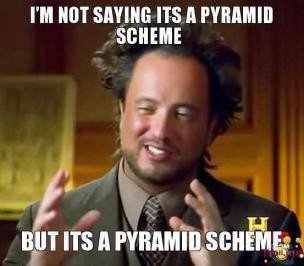
So does this make Avon a pyramid scheme?
The major difference between a pyramid scheme and an MLM is that pyramid schemes don’t usually have products.
Avon absolutely does have products, and many Avon reps do seem to focus more on selling the products than the business opportunity (up until I left the UK, I still had regular Avon catalogues pushed through my letterbox!).
What’s more, Avon has a large range of products, and the general consensus is that they are pretty decent quality and good value.
HOWEVER, just because a company sells products doesn’t mean that it cannot be functioning as a pyramid scheme behind the scenes.
To figure this out, we must follow the money.
If Avon is functioning as a pyramid scheme, then the majority of their revenue will come from their recruits rather than sales of products to retail customers.
As Avon does not publish regular income disclosure statements, it is impossible to truly say where they are getting the majority of their money from, but it is certainly interesting to see that Avon continues to aggressively recruit new sales representatives despite overall revenue being at a constant decline.
Without being able to look at the numbers, all we have to go off is Avon’s own statements, and what they say about Avon’s intentions as a company.
It’s speculation for sure, but I think it’s pretty clear where Avon’s priorities lie – Avon does not see a real need to push their products in order to drive product sales. They are pushing the opportunity, despite knowing that very few Avon Representatives are actually making a liveable income.
Why are they doing this?
Because signing up to be an Avon Rep costs money. You have to pay to join, you have to purchase products and sample packs and catalogues etc.
As an Avon Rep, you are spending far more money on Avon than Sandra from down the street.
As an Avon Rep then, you are not the owner of your own Avon business. You are an Avon customer.
So, is Avon a pyramid scheme?
I can’t say. I have my opinions, but I don’t want to get sued, and I also don’t want to tell you what to think.
I’ll just finish up here by reminding you of what Geralyn Breig, President of Avon North America thinks – ‘Right now, our direct-selling opportunity is really the No. 1 product that we have to sell,’
Personally, I think that says it all.
More MLM Articles
Why MLMs Are So Bad
The Secret Sister Christmas Pyramid Scheme
The Truth About the ‘Free’ Monat Cadillac
The Truth About the ‘Free’ Arbonne Mercedes
What’s the Difference Between Affiliate Marketing and Network Marketing?
MLM Buzzwords to Watch Out For
The Biggest MLM Lies
Is Scentsy a Pyramid Scheme?
Is Isagenix a Pyramid Scheme?
Is Color Street a Pyramid Scheme?
Is Beauty Counter a Pyramid Scheme?
Is Beachbody a Pyramid Scheme?
Is Selling Avon Worth It?
Is It Works! a Pyramid Scheme?
Is Monat a Pyramid Scheme?
Is Arbonne a Pyramid Scheme?
If you liked this article and would like to support my work, please click the button above to donate a couple of bucks and buy me a coffee. The ad revenue that I receive on this website is minimal, so support from my readers enables me to keep creating content that you (hopefully!) love to read.
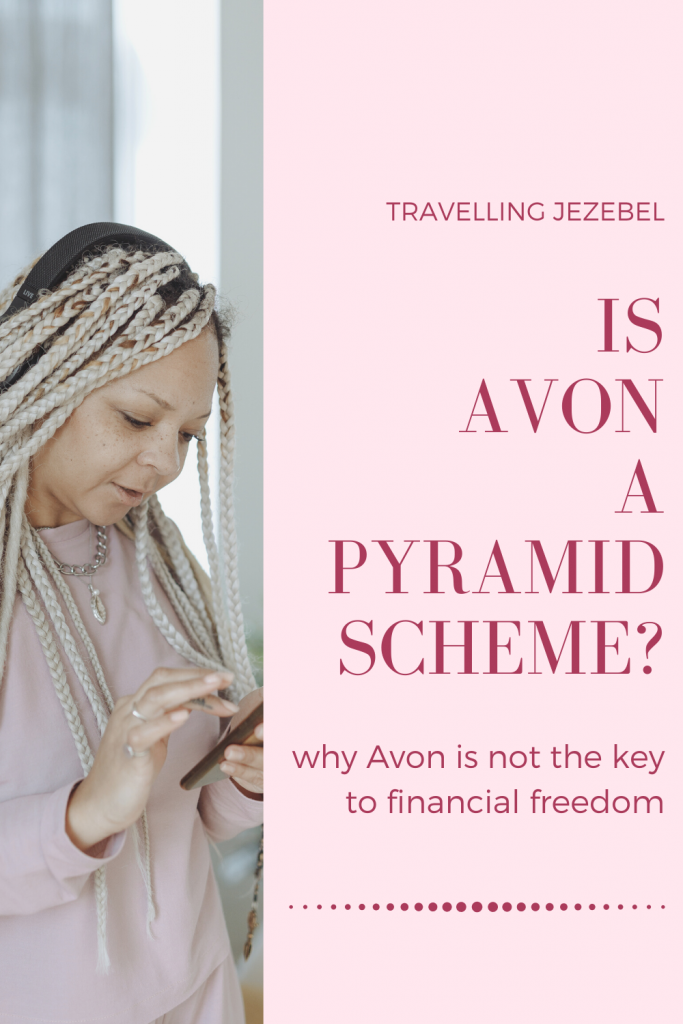
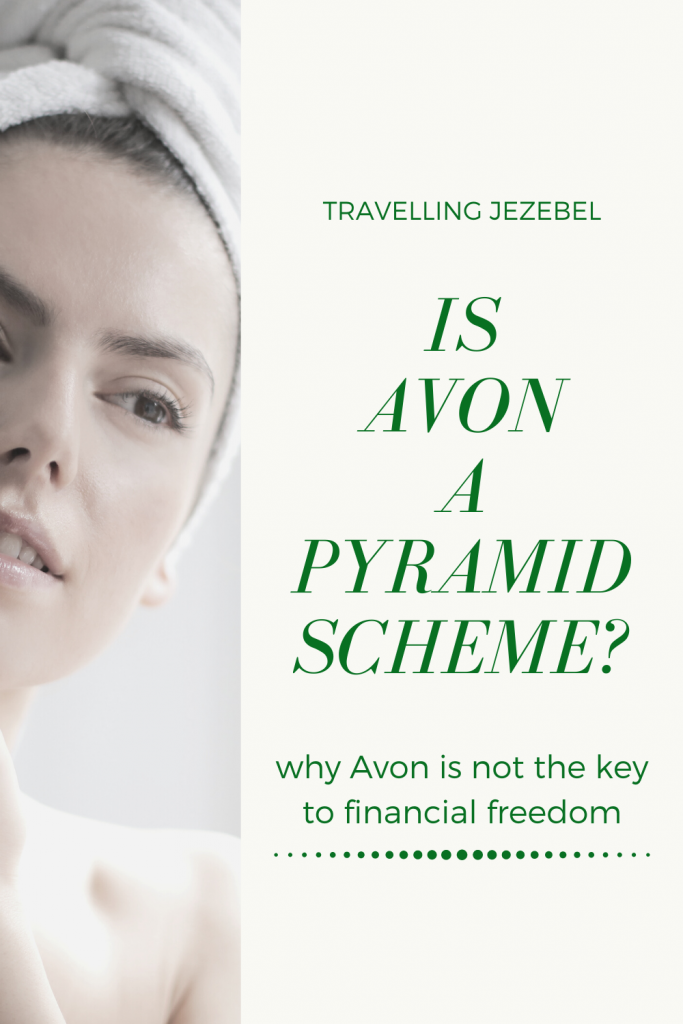
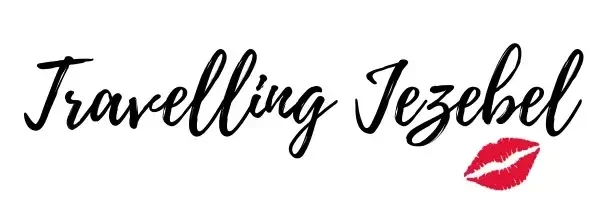
Articles like this are really damaging and I for one am very disappointed with it. I have been selling Avon for 10 years …I love the products, I love meeting new people. I am never pressurized to recruit or anything. If you want to make more money, the rules change. I do this part time, and I’m very happy.
If I knew nothing about Avon, your article would have put me off completely. Not impressed !!!
As I stated in the article, I like some of Avon’s products, but believe the fundamental structure of the business is unethical (as it stands today, not when it was purely direct sales).
Joining procedur??
Avon has been around since 1881 but some people are still skeptical about its legitimacy. I really enjoyed reading it. It was very interesting.
I completely agree with your assessment on Avon’s business model. As an ex-Avon representative, I can attest to the fact that the majority of the revenue comes from recruiting new reps, rather than selling the actual products. It’s frustrating to see so many people get caught up in the hype and waste their money on inventory that they’ll never be able to sell. Thank you for shedding light on this issue and providing a balanced view of Avon’s MLM structure.
Hi Dani-
Your site says this article was updated in April 2024. You may want to do a new fact check. Avon was purchased by LG and now goes by the name, New Avon,LLC. LG has moved the focus back to direct sales. While there is still an option to become a rep on the site’s landing page, it is not highlighted or pushed. It is now free to become a representative. There is no inventory, brochure, or sample purchase requirement. There are people who make money solely off of their online sales, similar to affiliate marketing. Representatives are not guaranteed commission off of any recruits who may happen to join their team. For the most part, the only way to make a livable wage with Avon is direct sales. You can also do it with online sales, if you have knowledge of social media. I understang bloggers like to recycle their older posts as fresh content, but you should fact check before you do. Happy travels!
Articles like this are really damaging and I for one am very disappointed with it. I have been selling Avon for 10 years …I love the products, I love meeting new people. I am never pressurized to recruit or anything. If you want to make more money, the rules change. I do this part time, and I’m very happy.